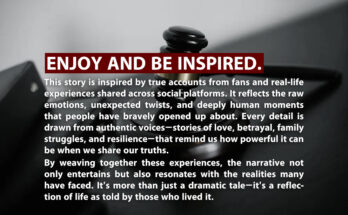I’m Callie, and I’ve spent the last twelve years building a life with Ryan—raising three kids, working full-time as a pharmacist, and holding our home together while he’s been unemployed for nearly a year. I’ve sacrificed sleep, self-care, and sanity to keep us afloat. So when he mocked me at his mother’s birthday dinner—comparing me to his polished ex-coworker and laughing about my appearance—I broke. Not with tears, but with truth. I stood up, made a toast, and exposed the weight I’ve carried alone. That night, I didn’t just speak—I reclaimed my worth in front of everyone.
Ryan had grown bitter since losing his job, deflecting his shame with sarcasm. He’d stopped trying, stopped helping, and started tearing me down. “You used to care,” he’d say, pointing at my scrubs. “You used to be pretty.” I stayed silent for months, hoping he’d snap out of it. But his cruelty at dinner—public, deliberate—was the final straw. I removed my wedding ring, placed it on the table, and walked out. I didn’t cry. I didn’t scream. I just left. Because sometimes, silence speaks louder than pain. And mine was roaring.
The next day, Ryan texted apologies. He showed up at our door, eyes red, voice low. “I was cruel,” he said. “I hated myself and took it out on you.” I listened, but I didn’t forgive. Not yet. I told him, “Don’t change for me. Change for yourself.” And slowly, he did. He started waking up early, helping with the kids, applying for jobs. He fixed the faucet, folded laundry, and made breakfast. It wasn’t grand—but it was real. And for the first time in months, I saw the man I married begin to return.
Three months later, Ryan got a steady job. He came home tired, hands marked with work, and smiled quietly. One night, while doing dishes together, I asked, “Why did you mention Anna?” He paused, then said, “I wanted to hurt you. I felt small and blamed the person who kept showing up—you.” His honesty stung, but it mattered. “I didn’t want someone like her,” he added. “I wanted to feel like a man again.” I nodded. “Then be one. Not by comparison—but by contribution.” That night, we shared leftover cake and a quiet moment of truth.
Ryan never asked me to wear the ring again. He simply placed it in my palm one day. I didn’t put it on immediately. I waited. I watched. And I healed. Because forgiveness isn’t a gesture—it’s a journey. And Ryan had to earn every step. He did. Slowly, consistently, without expectation. And I began to believe again—not in perfection, but in progress. In the man who finally saw the woman behind the exhaustion. And in the woman who refused to be diminished.
So here’s what I’ve learned: love isn’t about appearances—it’s about presence. My husband mocked me at dinner, but I taught him a lesson he’ll never forget. I stood up, spoke out, and reminded everyone—including myself—that quiet sacrifice deserves loud respect. And now, every time I look in the mirror, I see more than tired eyes. I see strength. I see truth. I see a woman who chose herself—and won.


